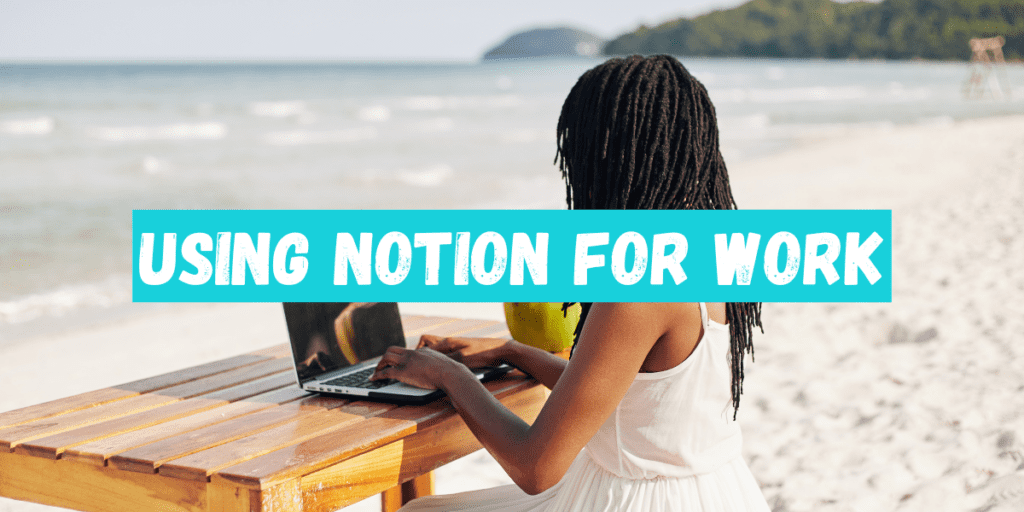Using Notion for Work
Are you looking for a tool that can help you manage your work more efficiently? Notion might be the answer.
Notion is an all-in-one workspace that can help you organize your tasks, notes, projects, and more. With its flexible and customizable features, you can tailor it to fit your specific needs and preferences.
Using Notion for work can help you streamline your workflow and boost your productivity. You can create databases to track your projects, tasks, and deadlines, and collaborate with your team in real-time.
You can also use it to take notes, write documents, and store files in one place. With its powerful search function, you can easily find what you need without wasting time.
In conclusion, Notion can be a game-changer for your work. By using it to manage your tasks, projects, and notes, you can save time, increase efficiency, and stay organized. Whether you’re a freelancer, entrepreneur, or part of a team, Notion can help you achieve your goals and reach your full potential.
Key Takeaways
- Notion is an all-in-one workspace that can help you organize your tasks, notes, projects, and more.
- Using Notion for work can help you streamline your workflow and boost your productivity.
- Notion can be a game-changer for your work by saving time, increasing efficiency, and keeping you organized.
Using Notion for Work

Overview
Notion is an all-in-one workspace that can be used for work, personal, and educational purposes. It is a powerful tool that helps you stay organized, manage tasks, collaborate with teams, and more. With Notion, you can create pages, databases, tables, boards, and custom views that suit your needs.
Getting Started
To get started with Notion, you can sign up for an account and create a workspace. Once you have created a workspace, you can start creating pages and databases. Notion provides several templates that you can use to get started quickly. You can also create your own templates and customize them to suit your needs.
Creating Pages and Databases
In Notion, pages are like documents that contain text, images, videos, and other types of content. You can use pages to take notes, write articles, create wikis, and more. Databases, on the other hand, are like spreadsheets that contain structured data. You can use databases to manage tasks, track projects, store customer information, and more.
To create a page or database, you can click on the “+” icon in the sidebar and select the type of page or database you want to create. You can also import data from other tools like Trello, Asana, and Excel.
Organizing Your Workspace
In Notion, you can organize your workspace using pages, databases, and other types of content. You can create a hierarchy of pages and databases, use dropdowns to categorize content, and use timelines to visualize deadlines and milestones. Notion also provides several views like table, board, list, and gallery that you can use to customize the way you view your content.
Collaborating with Teams
Notion is a great tool for collaborating with teams. You can invite team members to your workspace and assign tasks to them. You can also use comments and mentions to communicate with team members and provide feedback. Notion integrates with other tools like Slack, Google Docs, and Asana, which makes it easy to collaborate across different platforms.
Managing Tasks and Projects
Notion is a powerful tool for managing tasks and projects. You can use databases to track tasks, assign deadlines, and monitor progress. You can also use templates to create workflows and automate processes. Notion provides several features like calendars, timelines, and Gantt charts that help you stay on top of your tasks and projects.
Customizing Views
Notion allows you to customize views to suit your needs. You can create custom views using filters, sorts, and grouping. You can also use formulas and functions to perform calculations and manipulate data. Notion provides several blocks like text, images, videos, and more that you can use to create custom views.
Integrating with Other Tools
Notion integrates with other tools like Zapier, API, and Embeds, which makes it easy to connect with other platforms. You can use Zapier to automate workflows, use API to build custom integrations, and use Embeds to embed content from other platforms. Notion also provides several integrations with popular tools like Slack, Asana, and Trello.
Conclusion
In conclusion, Notion is a powerful tool that can help you improve your productivity and organization in the workplace. By centralizing all your work-related information in one place, you can easily access and manage your tasks, projects, notes, and more.
With its flexible and customizable features, you can adapt Notion to your specific needs and preferences, whether you work in a team or as an individual. You can create databases, templates, calendars, and other tools that suit your workflow and style.
Moreover, Notion integrates with other apps and services, such as Google Drive, Trello, Slack, and more, which means you can streamline your work and reduce the need for switching between different tools.
However, like any tool, Notion has its pros and cons, and it may not be the best fit for everyone. Some users may find it overwhelming or too complex, especially if they are used to simpler tools or methods. Others may prefer more specialized tools that focus on specific tasks or industries.
Therefore, before you start using Notion for work, you should evaluate its suitability and benefits for your needs and goals. You should also consider the learning curve and the time investment required to master Notion’s features and functions.
Overall, if you are willing to invest time and effort into learning and using Notion, it can be a game-changer for your work productivity and organization. It can help you stay focused, efficient, and creative, and enhance your collaboration and communication with your colleagues and clients.
Want the go-to, be all and end all Notion guide? Check out this post:
The Ultimate Notion Mastery Guide: Tips and Tricks for Maximum Productivity